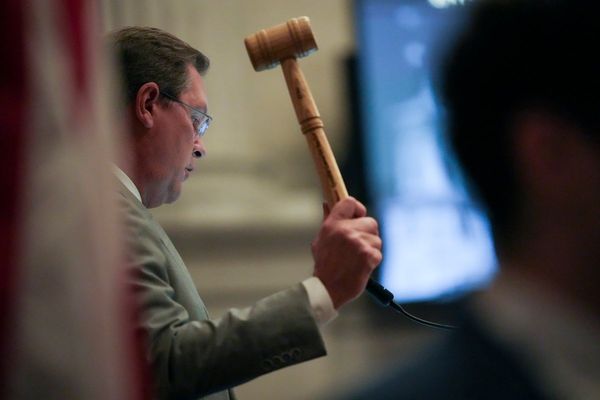
As Donald Trump prepares to retake the US presidency, experts are cautioning his policies could damage the economy of Australia's biggest trading partner and drive up borrowing costs - though there might also be benefits.
Analysts don't expect Australia to be directly impacted by one of Mr Trump's signature issues - tariffs - but that doesn't mean their fallout won't be felt.
"Australia obviously isn't really in the firing line for that, because Australia doesn't produce those strategic goods that America sees as a threat - we're more on the commodities side of things," Katrina Ells, the Sydney-based head of Asia-Pacific economics at Moody's Analytics, told AAP.
However, Australia's economy is closely tied to China's, which has already experienced pronounced economic weakness over the past year or so, she noted.
"Basically, however China is hit, whether via extreme tariffs directly or whether it be via a reduction in global trade, then a weaker China translates to a weaker Australia," Ms Ells said.
"If China isn't able to turn around that domestic weakness and then it's hit on the export side via these tariffs, and then weaker consumption as well, then Australia will experience a weaker trajectory that way."
John Kunkel, a senior economics adviser at the United States Studies Centre and the former chief of staff for Scott Morrison, says that Australia's government is understandably very focused on whether domestic companies might be hit by Mr Trump's tariffs - but he sees an upside in what he described as Mr Trump's pro-growth policies.
Australia's major miners have projects in the US that would benefit from an easing of red tape, and our superannuation funds are heavily invested in America and would deliver better returns to members if the US economy continues to boom, he said.
"I think we just have to be aware of not a one-dimensional sort of economic debate," Dr Kunkel said.
"There's no question that Australia has an interest in avoiding trade wars - that's our big national interest here, and that's paramount - but as always, there'll be areas where companies are looking to take advantage of what might be the upside as well."
Dr Kunkel warned, however, that the US budget deficit equalled six per cent of the country's gross domestic product in 2023, up from 5.4 per cent in 2022. Its total federal debt stands at $US36.2 trillion, and rising.
"It's not like there isn't some potential reckoning at some point in the future for what is arguably an unsustainable fiscal position," he said.

Greg Boland, the Auckland-based chief strategy officer at Tiger Brokers Australia, said Mr Trump had proposed cutting the US corporate tax rate from 21 per cent to 15 per cent, an idea he also put forward in his first administration.
Unless that lost tax revenue is raised elsewhere, it could raise the US debt by as much as $US7 trillion, Mr Boland said.
"So that will be a big, big factor," he said.
"The cost of borrowing for all - not just US people, but everyone globally - could be affected by higher Treasury yields," Mr Boland said.
That's already happening, he said, with the yield of the US 10-year Treasury notes that the US government issues to finance its debt nearing their highest level since November 2023.
"So tax cuts could drive up borrowing costs, drive up interest rates and repayments, not just for the US, but also the Australian government, as well," he said.
Australia's economy also relies on foreign capital, so an increase in borrowing costs would be to its detriment, he said.
Ms Ells said the market consensus before Mr Trump was elected was that the Federal Reserve would cut interest rates this year by a full percentage point, but that has since dropped to around half a percentage point because of the predicted inflationary impact of Mr Trump's policies.
It is possible, however, that any tariffs Mr Trump imposes on China could help some Australian exporters, such as wheat producers, because China might choose to buy wheat from Australia instead of the US, Mr Boland said.
All three experts cautioned that Mr Trump was famously mercurial and it was unclear whether he would carry out his threats, particularly around tariffs.
"We are now in the hands of billionaires who are going to control and dominate the world, basically," Mr Boland said.
"So interesting few days, and it'll be interesting to see what he does when he has his executive orders, whether on that first day, he tries to do too much, or comes out with some untoward things - which is anyone's guess, to be sure."







